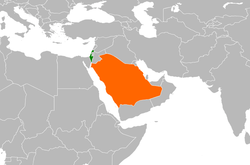Israel–Saudi Arabia relations
 |
|
Israel |
Saudi Arabia |
|---|---|
Israel and Saudi Arabia do not have diplomatic relations. However, both countries are allies of the United States and oppose the expansion of regional influence by the Islamic Republic of Iran. News reports have surfaced indicating behind-the-scenes diplomatic and intelligence cooperation between the countries.[1][2]
Overview
A charter member of the Arab League, Saudi Arabia has supported Palestinian rights to sovereignty, and called for withdrawal from the West Bank and other territory occupied by Israel since 1967. In recent years, Saudi Arabia has changed its viewpoint concerning the validity of negotiating with Israel. It calls for Israel's withdrawal from territory occupied in June 1967 in order for peace with the Arab states; then-Crown Prince Abdullah extended a multilateral peace proposal based on withdrawal in 2002. At that time, Israel did not respond to the offer. In 2007 Saudi Arabia again officially supported a peaceful resolution of the Arab–Israeli conflict, which generated more official negative reactions from Israeli authorities, citing the Oslo Accords and the Saudi's deviation from those accords.
Saudi Arabia rejected the Camp David Accords, claiming that they would be unable to achieve a comprehensive political solution that would ensure Palestinian Arabs can all move to Israel and the division of Jerusalem. In response to Egypt "betraying" the Arab States and signing peace with Israel, Saudi Arabia, along with all the Arab States, broke diplomatic relations with and suspended aid to Egypt; the two countries renewed formal ties in 1987.
Saudi Arabia does not have diplomatic relations with Israel. In 2005, Saudi Arabia announced the end of its ban on Israeli goods and services, mostly due to its application to the World Trade Organization, where one member country cannot have a total ban on another. However, as of August 2006, the Saudi boycott was not cancelled.[3][4][5] However, Saudi Arabia recognizes that its ally, the United States, has a strong and supportive relationship of Israel.
Saudi Arabia played an active role in attempting to bring the Palestinians towards a self-governing condition which would permit negotiations with Israel. It has done so primarily by trying to mend the schism between Fatah and Hamas, most notably when King Abdullah invited the two factions to negotiations in Mecca resulting in the Mecca Agreement of February 7, 2007. The agreement soon failed, but Saudi Arabia has continued to support a national unity government for the Palestinians, and strongly opposed the war in Gaza in early 2009.
The Times has reported that Saudi Arabia has tested the ability to stand down their air defenses to allow an Israeli strike on Iran to pass through their airspace.[6] Both nations have denied this.[7][8]
After the Arab Spring, Israel views the Saudi government as "guarantor of stability", according to the New York Times. In 2011, Israel approved a German sale of 200 Leopard tanks to Saudi Arabia.[9] The approval came from Uzi Arad, the national security advisor to Benjamin Netanyahu.[10]
During the 2014 Israel–Gaza conflict, Middle East Eye editor David Hearst wrote an article claiming that Saudi Arabia was supportive of Israel's actions in the conflict, and that officials from Mossad and the Saudi intelligence agencies met regularly.[11] The Saudi ambassador to the United Kingdom, Mohammed bin Nawwaf bin Abdulaziz, denied that the Saudi government was allied with Israel, describing Israel's actions against civilians in Gaza as "crimes against humanity" - however he did not deny that the two countries had had contact, saying that "any dealings by the Kingdom of Saudi Arabia with Israel have been limited to attempts to bring about a plan for peace".[12]
See also
- History of the Jews in Saudi Arabia
- Foreign relations of Israel
- Foreign relations of Saudi Arabia
- International recognition of Israel
References
- ↑ Robert Bridge (12 December 2013). "Accidental allies? Saudi Arabian intel chief allegedly meets Israelis". RT. Retrieved 6 January 2014.
- ↑ Greg Myre (25 September 2006). "Olmert reportedly held secret meeting with king of Saudi Arabia". International Herald Tribune. Retrieved 6 January 2014.
- ↑ David Krusch (2006-08-02). "Saudi Arabia Continues Boycott of Israel". Jewish Virtual Library.
- ↑ ELI LAKE (2006-06-21). "Saudi Ambassador Says Trade Boycott of Israel Will Not End". New York Sun.
- ↑ Arab League Boycott of Israel PDF (42.1 KB) CRS Report for Congress by Martin A. Weiss. Order Code RS22424. April 19, 2006
- ↑ Saudi Arabia gives Israel clear skies to attack Iranian nuclear sites
- ↑ "Israel denies Saudis gave IDF airspace clearance for Iran strike". Haaretz. 2009-01-01.
- ↑ "Saudi denies Israel airspace deal against Iran". 2010-06-14.
- ↑ "German Leader Criticized for Report of Tank Deal". New York Times. 2011-07-06.
- ↑ "Tank Exports to Saudi Arabia Signal German Policy Shift". Der Spiegel.
- ↑ Hearst, David (20 July 2014). "Saudi Israeli alliance forged in blood". Middle East Eye. Retrieved 26 July 2014.
- ↑ "Saudi Ambassador responds to David Hearst" (Press release). Embassy of the Kingdom of Saudi Arabia in the United Kingdom. 26 July 2014. Retrieved 26 July 2014.
|first1=missing|last1=in Authors list (help)
External links
| |||||||||||||||||||||||||||||||||||||||||
| ||||||||||||||||||||||||||||||

